Bachelor’s Degree in Business Management: A Degree Worth Considering
Bachelor in Business Management, also known as Bachelor of Business Administration (BBA), is an undergraduate academic degree program that equips students with foundational knowledge and skills in various aspects of business and management. It is designed to provide a comprehensive understanding of the principles and practices required to navigate the dynamic world of commerce.
According to the Bureau of Labor Statistics, the employment rate for business and financial occupations is estimated to grow 7% from 2021 to 2031. That’s good news for undergraduate students pursuing the business management program.
Read on as we unravel the degree in business management.
What is the cost required for a business management degree program?

According to the US Department of Education, the average cost of pursuing a business management degree averages $131,600 over the entire four years duration of the business degree for private schools and $60,400 for four years in public schools. Master in Business Administration Programs will cost around $10,000 to $150,000 for students and business professionals who are looking for continuing professional development through education.
Of course, there is financial aid available in some schools. However, you must think about your degree choices thoroughly because the financial investment required with most bachelor’s degrees requires a massive financial investment.
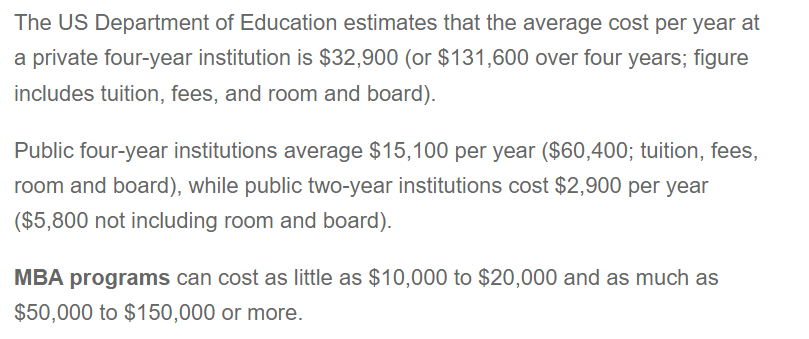
Bachelor of Business Management Admission Requirements

Admission requirements for a Bachelor of Business Management program typically include the submission of high school transcripts or equivalent academic records. Applicants are often required to meet a minimum Grade Point Average (GPA) and demonstrate proficiency in English for non-native speakers. Additionally, some universities may request letters of recommendation and a statement of purpose outlining the applicant’s career goals and motivations.
Standardized entrance exams like the SAT or ACT may also be required to assess academic readiness. It is important for prospective students to review the specific admission criteria of the institutions they are interested in to ensure they meet the necessary requirements for this program.
Bachelor’s in Business Management Topics and Coursework Covered

A Bachelor’s in Business Management program covers a wide range of topics and coursework to provide students with a comprehensive understanding of the business world. Some of the key subjects and areas of study typically included in this degree program are:
Principles of Management:
This foundational course introduces students to the basic concepts of organizational management, organization behavior, strategic management, risk management, and understanding the business environment Students learn about management styles and techniques to effectively lead teams and organizations.
With business experience, proven competencies, and a bit of luck, business degree holders are expected to have management occupations and positions in the long run!
Accounting and Financial Management:
This coursework delves into business finance as a whole, from financial accounting principles to budgeting, financial analysis, and financial decision-making. Students learn all the skills necessary for accounting competency to interpret financial statements, capital budgeting, managerial accounting and use financial data to make strategic business decisions in their actual business career.
Marketing and Sales:
Students explore marketing strategies, market research, product development, consumer behavior, and modern digital marketing practices. They learn to create marketing plans and develop effective sales techniques to promote products and services while ensuring good customer relationship management throughout every business cycle. The sales and marketing manager are also expected to understand data analysis to assess marketing and sales performance.
Business Ethics and Corporate Social Responsibility:
This course examines ethical issues in business and the importance of corporate social responsibility. Students learn how to navigate ethical dilemmas and make socially responsible business decisions.
Operations Management:
Students learn about the design, planning, and control of business operations to ensure efficiency and productivity. Topics may include supply chain management, quality control, and process improvement. Ensuring that overall organizational performance is positive is one role a business management degree holder can handle in the future.
Human Resource Management:
This course covers recruitment, training, performance management, employee relations, and labor laws. Students gain the skills to effectively manage human resources within an organization.
Business Law and Contracts:
This coursework examines the legal framework of business, including contract law, intellectual property rights, and business regulations. Informed decisions through a proper understanding of the law is a must for business professionals.
Entrepreneurship and Innovation:
This course introduces students to the principles of entrepreneurship and the process of starting and managing a new business venture. This includes understanding the financial markets and even touching a little bit on financial forecasting to have sound business decision-making skills.
International Business:
Students study the complexities of global markets and business operations, including international trade, cultural differences, and international markets efficiency.
Business Communication:
This coursework focuses on developing effective written and oral communication skills for professional settings. Having strong business acumen is not enough if a person is incapable of communicating his ideas and plans to the higher-ups and clients, this is the reason why business communication is a part of the business degree curriculum.
Information Technology Management:
Students learn about the role of technology in business and the fundamental concepts of how to leverage IT systems to enhance business processes and operations. This includes being able to handle basic and advanced data management and data analysis for business reports.
These topics and coursework provide students with a well-rounded education in business management, equipping them with the knowledge and skills to thrive in various business roles and industries.

Average Length of Bachelor’s in Business Management Program
The average length of a Bachelor’s in Business Management program is typically four years for full-time students. This four-year duration is based on a standard academic calendar with two semesters per year. However, the actual length of the program can vary depending on factors such as the curriculum structure, the number of credits required, and the student’s course load.
Benefits of a Bachelor’s Degree in Business Management
A Bachelor’s Degree in Business Management offers a wealth of benefits that can set graduates on a path to success in the dynamic world of commerce. Here are some key advantages:
Diverse Career Opportunities:
With a Bachelor’s Degree in Business Management, graduates open doors to a wide range of career opportunities in various industries. Whether it’s finance, marketing, human resources, operations, or entrepreneurship, the degree equips students with essential knowledge and skills applicable across diverse business sectors.
Leadership and Management Skills:
The program aims to develop skills in leadership and management abilities, allowing students to effectively lead teams, make strategic decisions, and navigate complex business challenges. Graduates emerge as confident and competent leaders ready to drive organizational success.
Strong Analytical and Problem-Solving Skills:
Business Management degrees emphasize critical thinking and analytical abilities. Students learn to analyze data, identify business trends, and devise effective solutions to real-world problems, equipping them with valuable problem-solving skills sought after by employers.
Networking Opportunities:
College programs often provide access to a network of alumni and industry professionals, offering valuable networking opportunities. Engaging with experienced professionals can lead to internships, job placements, and mentorship, giving graduates a head start in their careers.
Entrepreneurial Ventures:
For aspiring entrepreneurs, a Business Management degree offers a strong foundation in business fundamentals, strategic planning, and financial management. Graduates can confidently launch and manage their own businesses, armed with the knowledge to drive their ventures to success.
Global Perspective:
Many business programs have a focus on the global business environment, providing students with insights into international business practices and cross-cultural management. This global perspective is increasingly valuable in today’s interconnected world, where business market efficiency is measured and viewed on a global scale.
High Earning Potential:
Statistics consistently show that individuals with a Bachelor’s Degree in Business Management tend to earn higher salaries than those with only a high school diploma or an associate degree. The degree’s versatility and applicability across industries make graduates more marketable to employers.
Personal and Professional Development:
Beyond academic knowledge, business programs often emphasize personal and professional development. Students enhance their communication, presentation, and teamwork skills, making them well-rounded professionals who can thrive in collaborative environments.
Versatility and Sound Judgement:
Business environments are constantly evolving, and a Business Management degree instills adaptability, agility, and critical thinking skills in graduates. They learn to embrace change, innovate, and respond to market trends effectively, staying ahead of the competition.
Stepping Stone to Higher Education:
A Bachelor’s Degree in Business Management can serve as a stepping stone for further education, such as pursuing a Master’s in Business Administration (MBA). An advanced degree can unlock even more senior-level positions and career advancement opportunities.
In conclusion, a Bachelor’s Degree in Business Management offers a myriad of benefits, from diverse career opportunities and leadership skills to networking advantages and high earning potential. With the knowledge and skills gained from this degree, graduates can embark on rewarding and successful careers in the ever-evolving business landscape.
What Is The Highest-Paying Job With A Business Management Degree?
One factor to think about when deciding on job opportunities is pay. Listed below are the highest-paying jobs you can get with a business management degree.
Supply Chain Manager
A Supply Chain Manager is responsible for overseeing the entire process of product or service delivery from the initial production or procurement to the final distribution to customers. They manage the flow of goods, services, and information throughout the supply chain, ensuring efficiency, cost-effectiveness, and timely delivery. Supply Chain Managers collaborate with various departments, suppliers, and logistics partners to optimize inventory, minimize costs, and maintain high-quality standards.
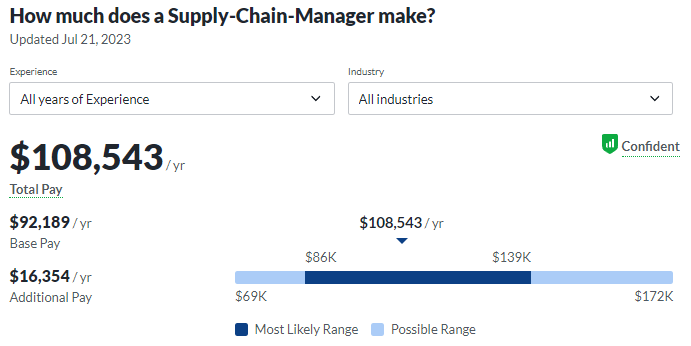
According to Glassdoor.com, Supply chain managers earn an average amount of $108,543 per year.
Financial Manager
A Financial Manager is a key player in the financial operations of an organization. They oversee financial planning, budgeting, and forecasting to ensure the company’s financial health and stability. Financial Managers analyze financial data, prepare reports, and provide strategic recommendations to senior management. They manage cash flow, investments, and financial risks, ensuring compliance with regulations and best financial practices.
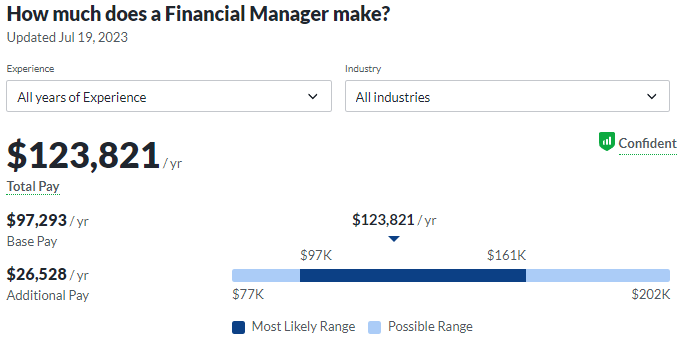
Financial managers earn about $123,821 per year. That’s proper pay for someone that handles the financial decisions of a company.
Project Manager
Project management is truly a booming industry due to the constant need for coherence in a business environment. This role defines project goals, creates timelines, allocates resources, and monitors project progress. They communicate with stakeholders, manage risks, and resolve issues to ensure projects are delivered on time, within budget, and with high-quality results. Project management plays a crucial role in coordinating cross-functional teams and ensuring projects meet organizational objectives.
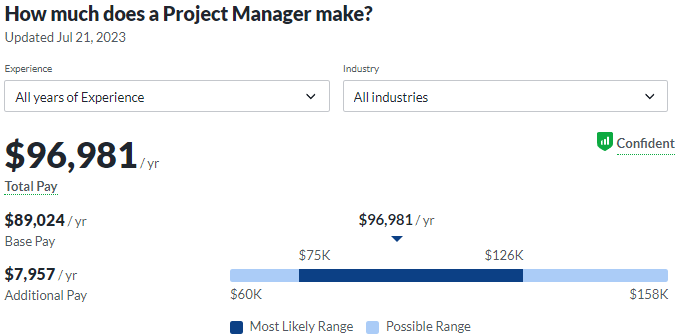
Project managers earn a few dollars shy of 6 figures. The annual average salary of project managers is $96,981 per year.
Marketing Managers
Marketing Managers are professionals responsible for planning, implementing, and overseeing marketing strategies and campaigns for products or services. They analyze market trends, conduct market research, and identify target audiences to create effective marketing plans. Marketing Managers collaborate with cross-functional teams to develop promotional materials, monitor campaign performance, and drive brand awareness to achieve business objectives.
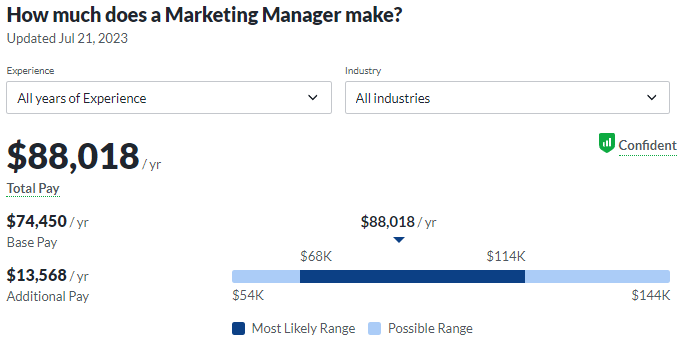
Marketing managers earn about $88,018 per year according to Glasssdoor.com.
Human Resource Managers
Human Resource Managers are professionals who oversee the human resource activities within an organization. They handle various HR functions, including recruitment, talent acquisition, employee training and development, compensation and benefits administration, and employee relations. HR Managers ensure compliance with employment laws and company policies, foster a positive work culture, and support the overall well-being and productivity of the workforce.
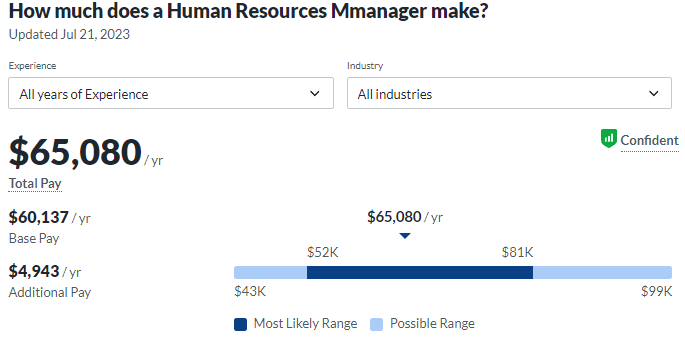
Human resources management can allow someone to earn about $65,080 per year. That’s good pay for someone that handles everything employee-related for the business.
Management Consultant
A Management Consultant is a professional who provides expert advice and solutions to businesses and organizations to improve their performance and efficiency. They work closely with clients to assess challenges, identify opportunities for growth, and implement effective strategies. Management Consultants conduct research, analyze data, and develop tailored recommendations to enhance operations, organizational structure, and management practices.
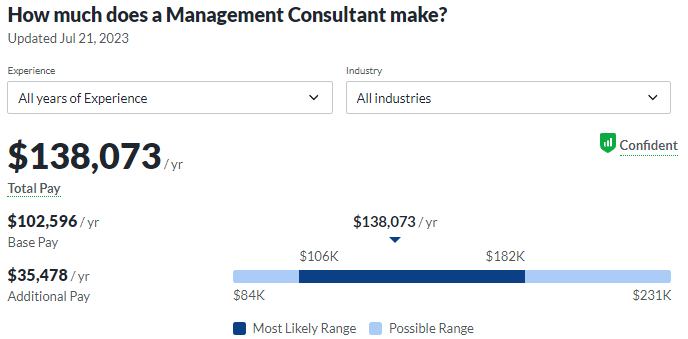
Chief Financial Officer
The Chief Financial Officer is a high-level executive responsible for managing an organization’s financial strategy and operations. They oversee financial planning, budgeting, and financial reporting, ensuring accurate and transparent financial information for stakeholders. CFOs assess financial risks, drive financial growth, and make strategic decisions to achieve the company’s financial objectives. They also collaborate with other executives to support overall business goals.
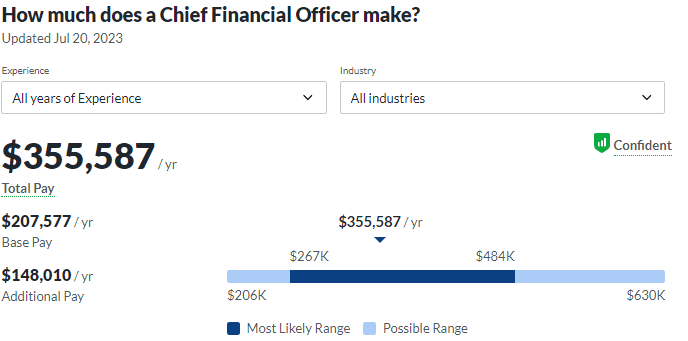
The highest rank on the list exhibits the highest pay on the list. With an average of $355,587 per year, Chief Financial Officers earn massive salaries for such a vital position.
Conclusion about Considering A Bachelor’s Degree in Business Management
In conclusion, considering a Bachelor’s Degree in Business Management can be a transformative choice that paves the way for a bright and promising future for any aspiring undergraduate student. By pursuing this degree, individuals gain the knowledge and skills necessary to excel in a variety of business fields, from finance and marketing to human resources and entrepreneurship.
What business management emphasizes is its adaptability and relevance across industries. Graduates are well-prepared to step into leadership roles, make strategic decisions, and drive organizational success. Moreover, the degree opens doors to diverse career opportunities, providing graduates with the flexibility to pursue their passion and interests within the business world.
With a Bachelor’s Degree in Business Management, one can embark on a role that ensures job satisfaction if you are inclined to a business career path, characterized by personal and professional growth, high earning potential, and the opportunity to make a positive impact in the corporate landscape.

… [Trackback]
[…] Find More to that Topic: shanehummus.com/college-degrees/business-management-overview/ […]
… [Trackback]
[…] Read More Information here on that Topic: shanehummus.com/college-degrees/business-management-overview/ […]
… [Trackback]
[…] Info to that Topic: shanehummus.com/college-degrees/business-management-overview/ […]
… [Trackback]
[…] Find More to that Topic: shanehummus.com/college-degrees/business-management-overview/ […]
… [Trackback]
[…] Find More to that Topic: shanehummus.com/college-degrees/business-management-overview/ […]
… [Trackback]
[…] Info to that Topic: shanehummus.com/college-degrees/business-management-overview/ […]
… [Trackback]
[…] Find More to that Topic: shanehummus.com/college-degrees/business-management-overview/ […]
… [Trackback]
[…] Read More on on that Topic: shanehummus.com/college-degrees/business-management-overview/ […]
… [Trackback]
[…] There you can find 91210 additional Info to that Topic: shanehummus.com/college-degrees/business-management-overview/ […]
… [Trackback]
[…] Find More Information here to that Topic: shanehummus.com/college-degrees/business-management-overview/ […]
… [Trackback]
[…] Find More here to that Topic: shanehummus.com/college-degrees/business-management-overview/ […]
… [Trackback]
[…] There you will find 77845 more Information on that Topic: shanehummus.com/college-degrees/business-management-overview/ […]
… [Trackback]
[…] Information on that Topic: shanehummus.com/college-degrees/business-management-overview/ […]
… [Trackback]
[…] Find More here on that Topic: shanehummus.com/college-degrees/business-management-overview/ […]
… [Trackback]
[…] Here you can find 5089 additional Info to that Topic: shanehummus.com/college-degrees/business-management-overview/ […]
… [Trackback]
[…] Information to that Topic: shanehummus.com/college-degrees/business-management-overview/ […]
… [Trackback]
[…] Read More Info here to that Topic: shanehummus.com/college-degrees/business-management-overview/ […]
… [Trackback]
[…] There you will find 94015 more Information on that Topic: shanehummus.com/college-degrees/business-management-overview/ […]
… [Trackback]
[…] Find More here on that Topic: shanehummus.com/college-degrees/business-management-overview/ […]
… [Trackback]
[…] Read More on that Topic: shanehummus.com/college-degrees/business-management-overview/ […]
… [Trackback]
[…] Here you will find 39674 more Info on that Topic: shanehummus.com/college-degrees/business-management-overview/ […]
… [Trackback]
[…] Find More on that Topic: shanehummus.com/college-degrees/business-management-overview/ […]